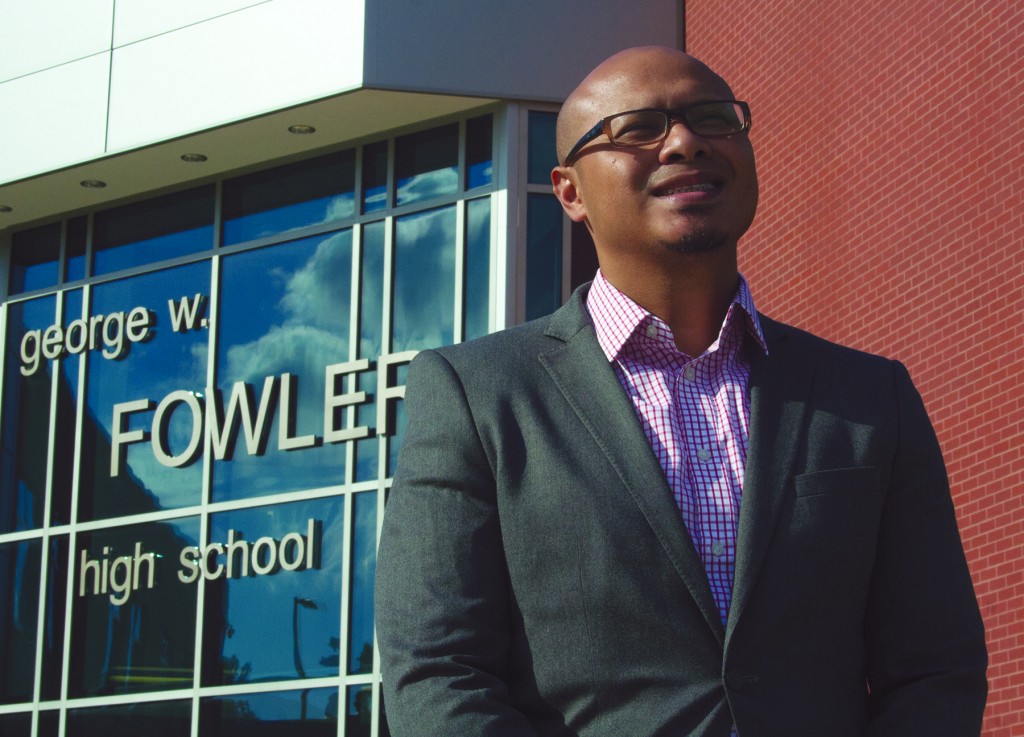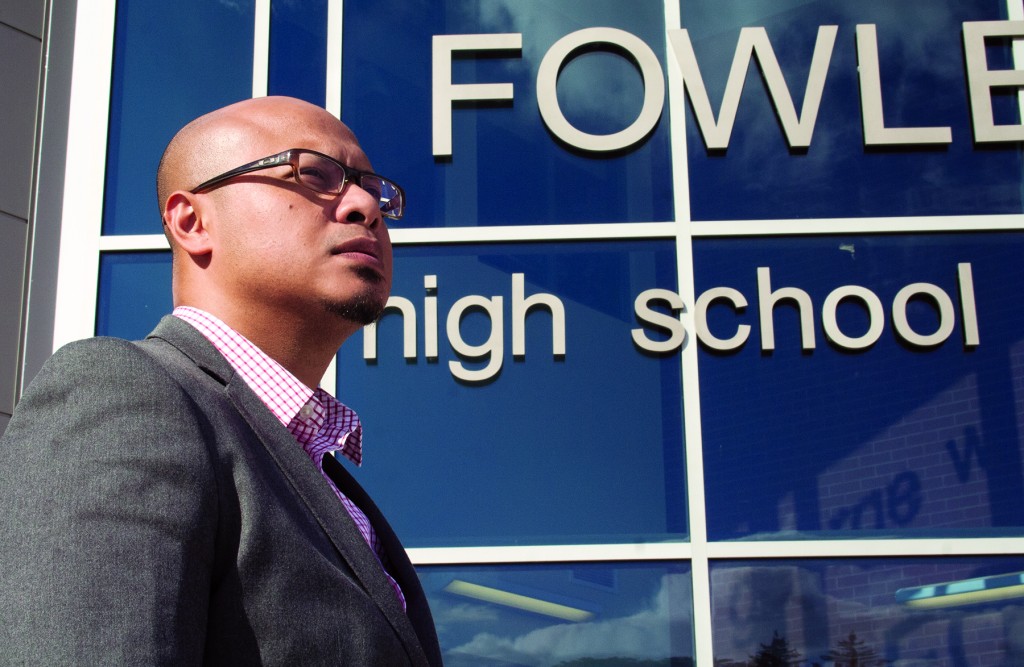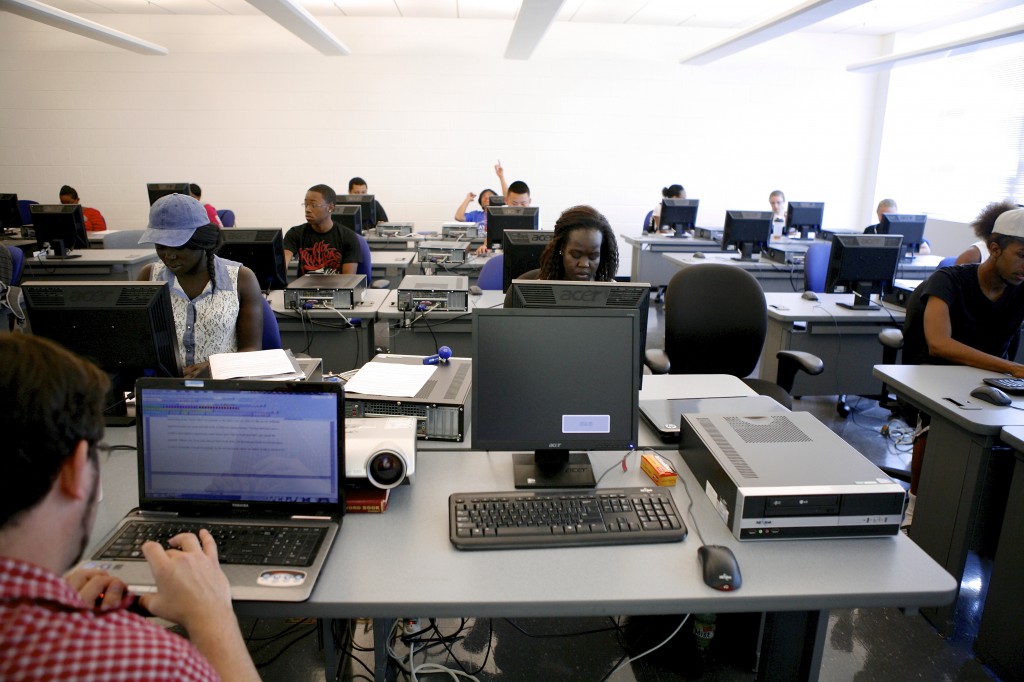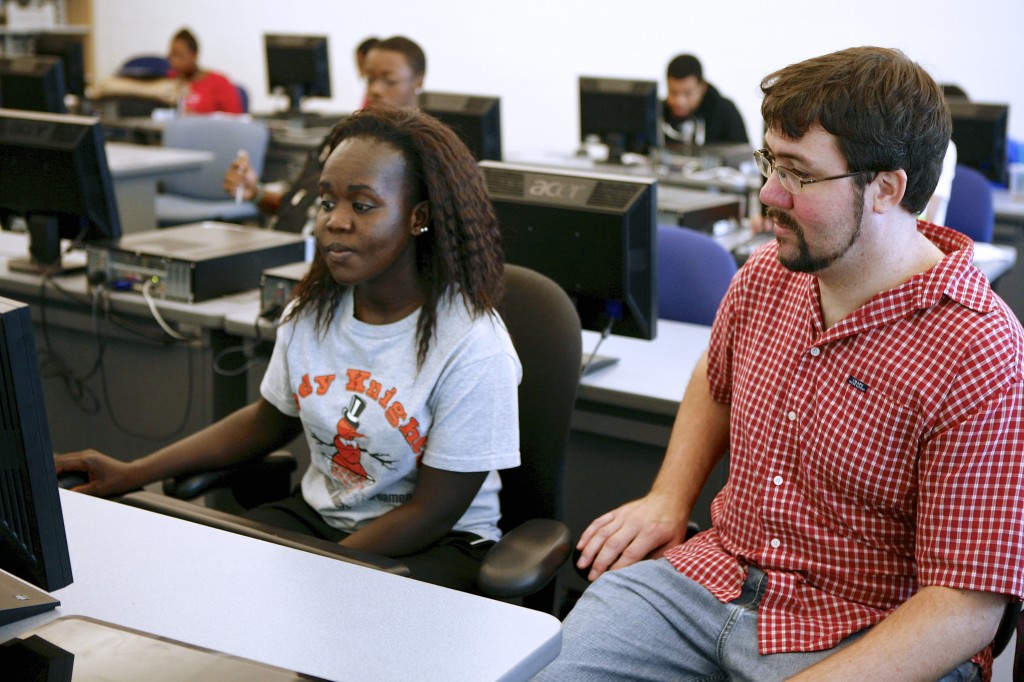Wednesday night, June 26, was Grand Slam Night at NBT Stadium. Samuel Johnson III, 22, a Corcoran alumnus and recent graduate of SUNY Canton, walked to home plate as one of three honorary captains carrying the Syracuse Chiefs scorecard to begin the second game of a doubleheader against the Scranton/Wilkes Barre Rail Riders. The Chiefs had bested the Rail Riders in the opener, 5-3.
Before the first pitch was thrown out in the nightcap, Nubia Hill, a Say Yes Scholar from Nottingham High School who is headed to Buffalo State in the fall, graced the crowd with her powerful rendition of the national anthem. Then Eddy Guzman, a recent Fowler High School graduate bound for SUNY Cobleskill and a participant in the Hillside Work-Scholarship Connection, threw out the honorary first pitch.
It was up to the Chiefs to do the rest, but the best they could manage was a split, dropping the nightcap, 6-3.

Herm Card photo
Despite the loss, Johnson and the other students at the stadium were in a celebratory mood. Say Yes to Education, On Point for College, and Hillside’s work/scholarship program had planned this night to celebrate the class of 2013 and the thousands of students who have gone on to college success with the help of their programs. In recent years, these three programs have collaborated on efforts to help ensure that students like Johnson, Hill and Guzman overcome the obstacles that might keep them out of school.
Say Yes Syracuse was hatched at fundraising dinner in New York City five years ago. Hillside began as a Syracuse City School District program. The On Point program, which isn’t as well known, started out of the trunk of a car in 1999. Ginny Donahue, a former teacher and social worker turned corporate executive, had been working to help city kids get back into school and on track for college for years before that. Donahue, of Hastings, has infused On Point with a spirit that tries to reach each kid and find out what they need to succeed.
Johnson first heard of On Point during his senior year at Corcoran. “My friends told me about it,” he recalled before the game. “They said you could get a voucher to go to the mall.”
That got his attention, and a $150 shopping spree to pick up clothing to start his freshman year was the beginning of a relationship that he credits with keeping him in school. With his acceptance to Canton in hand, Johnson, the first in his family to attend college, thought he was all set. Like a lot of kids in that situation, he just didn’t know what practical steps he needed to take to turn his dream of attending college into reality.
Enter On Point in the person of a counselor named Tiffany Rush.
“Tiffany noticed that I didn’t have anything done,” he says. “I hadn’t filled out the FAFSA {federal financial aid application}. I didn’t have a housing deposit. I had no sheets or towels. I was accepted at college but I didn’t know how to pay for it.”
Rush helped Johnson fill out the paperwork and helped him to understand the financial aid process.
Two weeks after his parents dropped him at school, an On Point volunteer stopped to visit. Anyone who has ever gone away at that age knows the feeling: A combination of homesickness and anxiety can set in. Too many kids leave school in the first semester as the result. Donohue, the On Point founder, pinpointed the key moments when counselors and volunteers need to reach out. Last year, On Point volunteers visited their students at 78 college campuses around the state.
For Johnson, that visit kept him going when things got tough. Over the course of his four years, On Point counselors made the trek to Canton 14 times just to see him.
“That first break came, and I didn’t know how I was going to get home,” he says. “The volunteers would drive me back and forth. These were people who really cared.”
Those car rides are just one piece of the On Point program, but they provide a key link. On Point students like Johnson feel a connection to the program and its people.
“We have 160 volunteers who drove 190,000 miles last year, taking students to school,” says Donohue. “For Thanksgiving break, 289 volunteers drove students back and forth to 80 different colleges.”
A few years back, On Point bought bus tickets for almost 80 students to get home for semester break. This year, they bought only a handful. Volunteers fill the gap. It’s not just a money saver, it’s a relationship builder.
Johnson is different from most On Point students in one respect: He comes from a two-parent family, and he was in high school when he joined the program.
“Sixty percent of our kids are not in high school on the day they join us,” says Donohue. “The other 40 percent most frequently are kids with diplomas who have not considered college.”
With so many kids out of school and on the streets, On Point sets up shop in community centers around the city. Young men and women find it there and start on the road back to school. Donohue knew that many students who had dropped out were still interested in college, but there were too many barriers in the road.
Donohue tells the story of a young man who came to her straight from jail. He was proud to tell her that he had earned his GED while incarcerated, but the diploma had gotten lost in the mail.
“He needed $10 to replace it, and for him that $10 was huge,” she recalls.
OnPoint wrote the check.
What does the program offer?
“It’s kinda like whatever it takes,” according to Donohue. “The message is, as long as you are making good decisions, we’ll support you.”
Some college students need a place to stay when they come home for the summer. Others need coats to make it through the winter. Some need help with books, others need eyeglasses so they can read them. One girl couldn’t study for finals because of an infected tooth; On Point found a dentist to take care of her.
“If you’re gonna make a mistake,” says Donohue, “you should make it on the side of kindness.”
Johnson is one of more than 2,000 students that On Point has helped get into college, succeed there and move on to the next step. He remembers how On Point helped pay for his last book in college: a $300 accounting textbook.
While enjoying the Chiefs game, he contemplated the options that his college degree in business management offers him. He had applied for jobs at three colleges in New York, hoping to work and earn his master’s degree. He credits On Point with helping him make it.
“They made sure I was OK,” he says. “I don’t think I could have gotten through college without them.”
Johnson has been hired by SUNY Canton as a residence director and will be getting a ride back to Canton to work in the fall. He’ll be driven by an On Point volunteer.
Since 2008, On Point has been helping graduates like Johnson find jobs and to help college students find summer jobs. The On Point program in Syracuse is housed at the Catholic Charities headquarters, 1654 W. Onondaga St., and its counterpart in Utica is based on the Mohawk Valley Community College campus, 524 Elizabeth St. Staff meets with students at 15 community centers in Syracuse and a half dozen in Utica.
Donohue runs the program on $1.7 million a year, most of it privately donated. In the past year, the New York State Higher Education Services Corporation has given On Point a half-million dollars to help replicate the program downstate.
That comes as no surprise to Jack Webb, who was the CEO of Alliance Bank before it merged with NBT. He’s an executive vice president at NBT, and one thing that doesn’t change for him is his support of On Point.
“Ginny {Donohue} has been able to get results for our investment,” he says as he sits in the NBT box above the first base line.
His company has hired On Point students as both interns and full-time employees. “The results of On Point,” says the banker, “have been inspirational.”
And he gives a lot of the credit to Donohue. “She doesn’t need guidance,” says Webb. “She needs prayers.”
Making a Difference
Before Say Yes, a local superstar recalls his troubled past and the dean who straightened him out

Michael Davis Photo
Emad Rahim speaks from experience. In his view, suspension doesn’t work.
Rahim is the university dean for business and management at Colorado Technical University, but as a young man growing up on Syracuse’s West Side, he considered himself the “suspension king” of both Grant Middle School and Fowler High School. A very energetic young man with a keen eye for trouble, Rahim was repeatedly suspended before a school administrator changed his life with one simple question.
Since he graduated Fowler in 1997, Rahim has attained degrees from Empire State College, Syracuse University, Tulane and the University of Maryland, has started businesses and not-for-profit organizations and starred in film and stage productions before starting his career in academic administration.
Speaking from his Chicago office, Rahim, 35, says he is not surprised to learn that the Syracuse city schools still have such a high suspension rate, and that the rate is disproportionately higher for African-American and Latino students. Reports earlier this year noted that 4,210 students were suspended nearly 10,000 times in the 2011-2012 school year, and that 14 percent of African-American students were suspended, double the rate of whites.
“Unless you have parents who are really involved in your school,” he says, “it didn’t mean much. When we were suspended, we just hung out. We didn’t go home. Students who were into sports took it more seriously. To me, it didn’t mean anything. If anything, I just got into more trouble.”
Buttons Arcade, once a notorious teen gathering place on Teall Avenue, was his preferred venue to party during suspensions in the 1990s.
“You pretty much had everybody there, from Henniger, Corcoran, Nottingham. We went there, or we hung out at the mall. I got suspended for being disruptive in class, for fighting. I got suspended for missing school,” he says, laughing at the irony. “I got in-school suspension but wouldn’t go to school to serve it.”
At the time, he knew little of programs designed to keep kids in school. “I would have benefited from peer mediation, some type of conflict resolution,” he notes. “I was resistant, just trying to show off. Sometimes a teacher can just talk to the student, but this {suspension} is just a quick way to get rid of the student. With me, that was the case.”
Contacting his parents was futile. His father had been killed by the Khmer Rouge in Cambodia when he was a toddler. His mother brought the family out of their homeland, finding their way to Brooklyn, where the young boy was shot in the leg during a random drug-related shootout. Eventually the family came to the Near West Side of Syracuse.
“My mother could barely read,” he recalls, “so if they sent a letter home, it didn’t mean anything. I think about the illiteracy, or people who don’t know English. I wonder how many of those letters get lost, how many messages get left that can’t be understood.”
His mother had remarried, and his stepfather proved to be abusive to her and the children. His mind was filled with violent memories when he walked through the doors of Grant and, later, Fowler. In retrospect, he says, it was no surprise that he acted out.
“I had no guidance, no father figure,” he says. “I was bored, we were poor and I was trying to be tough in a high school with a high rate of dropouts, teen pregnancy and violence.”
What no one seemed to notice was that Emad was brilliant, and that he had a learning disability. “In 11th grade,” he recalls, “they told me I was dyslexic.”

Michael Davis Photo
With extra academic help, his grades began to improve and he began to think of his future. More importantly, he met Willie Dowdell, then the dean of students at Fowler. Dowdell empathized with the young Emad Rahim.
“I’m from the bricks,” says Dowdell. “I had a tough time growing up. When I looked at Emad, I saw myself.”
“Here’s this Asian kid growing up with no father in a neighborhood of poor blacks, poor whites, poor Hispanics,” recalls Dowdell. “And he’s sitting in class and he can’t see. If you’re sitting there and you can’t see what’s on the board, you will act out. We started talking, looking into things that were important to him. He was looking for a role model.”
Until Dowdell entered the picture, Rahim saw himself continuing his career as a street dealer of illegal drugs. Dowdell challenged him to do better.
He took Rahim aside and asked him a question: “When do you sell most of your product?”
“That’s easy. The first week of the month, when people get their checks.”
“And how many kids aren’t getting the food they need because you’re taking the money from their parents?”
That really bothered Rahim, now married and the father of two young children. He credits Dowdell, who is vice principal at Jamesville-DeWitt High School, with turning his life around.
“He impacted a lot of kids,” Rahim says. “He would have us in his office. He showed up at my house. When he came to the house to talk to my mother, that scared the heck out of me.”
Dowdell set out to win the boy’s trust. Rahim recalls that he did that with all the kids. Dowdell talked to Price Chopper to set up students with part-time jobs. He talked to Ray Rinaldi and started bringing his kids to box in Rinaldi’s gym, on the North Side. Soon, he had so many students on board that he bought a van, using his own money, to transport them. Eventually, the gym moved over to Geddes Street.
“We now had gang members fighting each other in the gym, not out in the street,” says Dowdell. “For me it was never about boxing. The kids had to stay in school and get good grades if they wanted to participate. They really loved to box, so now they had something to lose. The kids had to change their behavior.”
At the time, his principal, Ron Spadafore, gave him the freedom to do what he felt was best for the students. According to Dowdell, not everyone was as supportive.
“They said to me that what you do after school is your business,” Dowdell says. “I said that what we do after school is what school should do: Change kids and save lives.”
Suspension isn’t off the table in his view, but it is no substitute for getting involved in a kid’s life. “Suspension can make a difference if the parent is not paying attention to the kids. All of a sudden the kid is around all the time, and they get a healthy dose of it. It begins to impact their life.”
“I look at education not as a job, but as a vocation. It has to be something you believe in more than anything. It makes you want to work outside the box. To work with these kids, you have to do something different, do something extra and the kid has gotta be willing to do it. Emad was willing to do whatever it took. He was willing to trust that if I told him to walk into the street blindfolded and he would be safe, he believed that he would be safe.”
By the end of his senior year at Fowler, Rahim had saved enough money to buy a used car. The car, it turned out, had a bad transmission. When the seller refused to make good on it, Rahim turned to Dowdell to help. Dowdell enlisted the help of the school’s police officer and paid the car dealer a visit. Rahim was surprised to hear this, because in his years at the school, he and the officer had rarely been on the same side of a sticky situation.
“He went down there and showed the badge and had the conversation with him, and before you know it I got a brand new transmission,” Rahim says. He smiles at the memory.
Dowdell, recalls Rahim, took “whatever it takes” to a whole new level.






